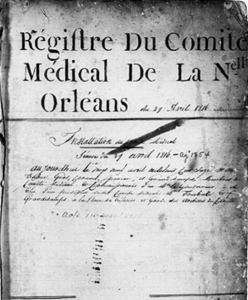As the tra de and population in New Orleans began to increase, the need for healthcare in the city increased as well. The diversity of the population beginning to settle in the city made it so that practitioners of various backgrounds who spoke different languages were necessary to aid the community. In turn, medical societies were formed. The societies were fairly unsuccessful, as practitioners struggled to communicate due to language barriers. Cultural differences led to varying medical opinions on courses of treatment, adding to the difficulty of creating a medical society of practitioners who shared similar ideologies. One of the more successful societies was called The West Feliciana Medical Society. These societies did things similar to that of the current-day American Medical Association, such as establish general standards for ethics, ettiequte, and health. A larger state-wide society was created later in 1878 that led to further advances in medicine, ethics, and ettiequte in the state of Louisiana, replacing the smaller societies mentioned above. This society, the Louisiana State Medical Society, is still in action today.
de and population in New Orleans began to increase, the need for healthcare in the city increased as well. The diversity of the population beginning to settle in the city made it so that practitioners of various backgrounds who spoke different languages were necessary to aid the community. In turn, medical societies were formed. The societies were fairly unsuccessful, as practitioners struggled to communicate due to language barriers. Cultural differences led to varying medical opinions on courses of treatment, adding to the difficulty of creating a medical society of practitioners who shared similar ideologies. One of the more successful societies was called The West Feliciana Medical Society. These societies did things similar to that of the current-day American Medical Association, such as establish general standards for ethics, ettiequte, and health. A larger state-wide society was created later in 1878 that led to further advances in medicine, ethics, and ettiequte in the state of Louisiana, replacing the smaller societies mentioned above. This society, the Louisiana State Medical Society, is still in action today.
Information about these societies can be found here. General information about medical societies throughout time in New Orleans can be found here.

January 24, 2018 at 4:57 pm
Sarah:
Thanks so much for this interesting post. I found this passage in Louisiana Medical Society history interesting: “A look at the agendas and actions taken by these pioneering societies might surprise today’s physician, not so much for their novelty and quaintness, but for their amazing similarity to important issues that confront the profession to this day. A committee was appointed to consider and report on bills submitted to the state legislature regarding health. Another would look into medical issues, such as the rapid spread of disease and compulsory vaccinations. And a need was voiced to examine the possibility of establishing examining boards, answering questions of a judiciary nature and developing a code of ethics. Early practitioners also appeared to be cognizant of the importance of public relations.”